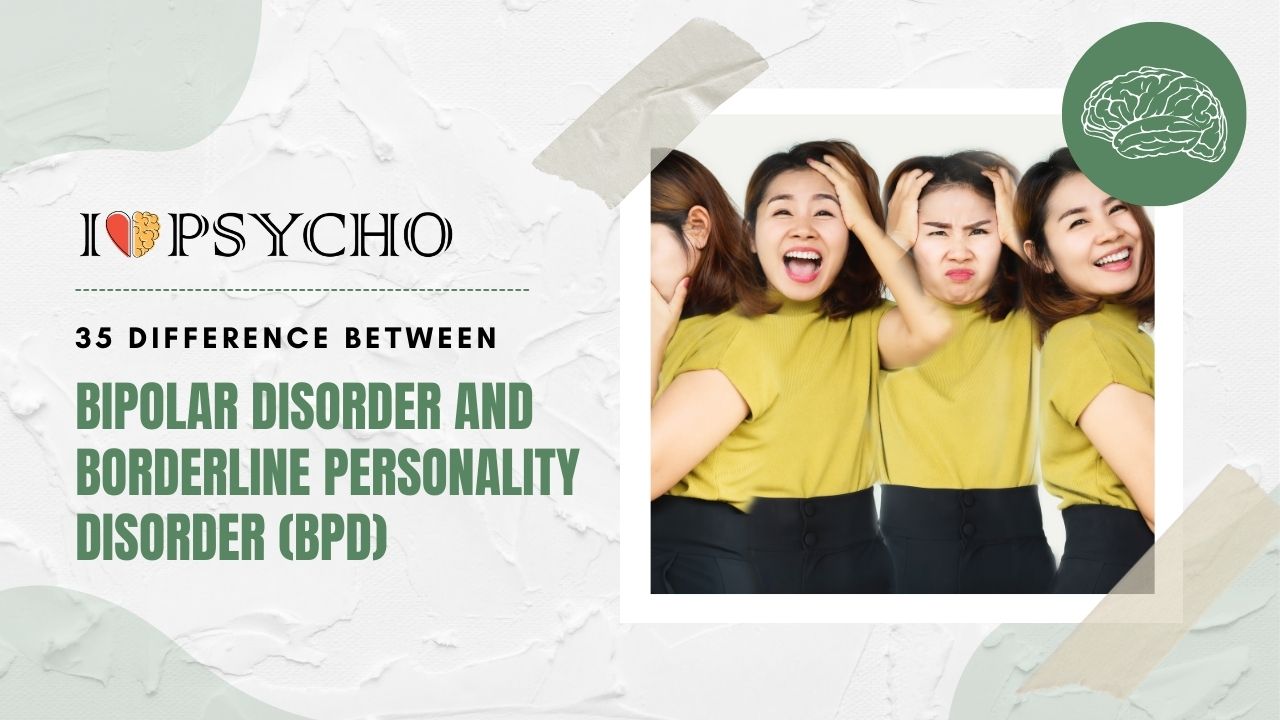The symptoms of Bipolar Disorder and Borderline Personality Disorder (BPD) sometimes coincide, leading to misdiagnosis. Their distinguishing traits set them distinctive. Manic-depressive disease, or bipolar disorder, causes significant mood changes. These mood changes range from depressive episodes, which cause intense sadness, lethargy, and loss of interest, to manic episodes, which provide enhanced mood, vitality, and impulsivity. In contrast, BPD involves self-image, relational, and emotional instability.
BPD sufferers frequently have a strong fear of abandonment, mood swings, and unstable relationships. Mood disturbance length and consistency are also important. Depressive or manic episodes endure for weeks or months in Bipolar Disorder, followed by stable intervals. BPD symptoms are more fluid, with mood swings and emotional instability happening daily.
Impulsivity exists, although its expression varies. Bipolar Disorder impulsivity is frequently motivated by manic episodes and is more organized, goal-directed, and irresponsible, leading to overspending and substance addiction. Impulsivity, caused by emotional dysregulation, can lead to self-harm, suicide, or impulsive aggressiveness in BPD, generally due to a perceived danger of abandonment.
Both diseases differ in self-perception and interpersonal connections. BPD patients may feel empty and have a fluctuating self-identity. This causes strong, unstable partnerships. In Bipolar Disorder, self-identity is more constant, although anger or grandiosity during manic episodes can cause interpersonal issues. Also, treatment methods differ. Bipolar Disorder is treated with mood stabilizers and antidepressants. Helpful psychotherapy can improve condition management. BPD treatment often emphasizes emotional control, distress tolerance, and interpersonal skills in dialectical behavior therapy (DBT).
Bipolar Disorder and Borderline Personality Disorder share mood swings and impulsivity, but their essential traits, length of mood disturbances, causes, and treatments are different. Misdiagnosis by a mental health expert might result in unsuccessful therapy. Accurate diagnosis and proper management of these illnesses need an understanding of their subtle variances.
35 differences between Bipolar Disorder and Borderline Personality Disorder (BPD):
|
S.No. |
Aspects |
Bipolar Disorder |
Borderline Personality Disorder (BPD) |
|
1 |
Diagnostic category |
Mood disorder |
Personality disorder |
|
2 |
Mood disturbances |
Characterized by episodes of mania or hypomania and depression |
Characterized by emotional instability, including mood swings |
|
3 |
Onset |
Typically emerges in late adolescence or early adulthood |
Often emerges in late adolescence or early adulthood |
|
4 |
Mood episode duration |
Mood episodes (mania or depression) are typically longer in duration |
Mood fluctuations can be rapid and occur within hours or days |
|
5 |
Mania or hypomania |
Episodes of mania or hypomania are key features |
Lacks episodes of mania or hypomania |
|
6 |
Mood stability |
Between mood episodes, individuals may have periods of stability |
Frequent mood fluctuations within a single day or week |
|
7 |
Medication treatment |
Often managed with mood stabilizers, antipsychotics, or antidepressants |
Typically managed with psychotherapy (e.g., dialectical behavior therapy) |
|
8 |
Biological basis |
Linked to neurotransmitter imbalances and genetic factors |
Biological and genetic factors contribute, but the cause is less understood |
|
9 |
Impulsivity |
May exhibit impulsivity during manic or depressive episodes |
Chronic impulsivity is a hallmark feature |
|
10 |
Suicidal behavior |
Risk of suicide is associated with depressive episodes |
High risk of self-harm and suicidal behavior, especially during crises |
|
11 |
Self-esteem |
Self-esteem is often influenced by mood state |
Self-esteem is unstable and influenced by interpersonal relationships |
|
12 |
Psychosis |
Can experience psychosis during manic or depressive episodes |
Generally does not experience psychosis outside of extreme stress |
|
13 |
Substance abuse |
Elevated risk of substance abuse during manic episodes |
Elevated risk of substance abuse, often as a coping mechanism |
|
14 |
Sleep disturbances |
Disrupted sleep patterns are common during mood episodes |
Sleep disturbances are common and not necessarily tied to mood episodes |
|
15 |
Cognitive symptoms |
Cognitive symptoms may include racing thoughts during mania |
Cognitive symptoms may include identity disturbance or dissociation |
|
16 |
Social relationships |
May experience relationship difficulties due to mood swings |
Intense, stormy relationships with fear of abandonment |
|
17 |
Impairment in work |
Impairment often occurs during mood episodes |
Impairment may occur due to chronic emotional instability |
|
18 |
Course of illness |
Characterized by mood episodes and periods of stability |
Chronic emotional instability with varying intensity |
|
19 |
Affective instability |
Occurs episodically, with stable periods in between |
Persistent, pervasive affective instability |
|
20 |
Response to treatment |
Typically responds well to mood-stabilizing medications |
Typically requires psychotherapy as the primary treatment |
|
21 |
Medication discontinuation |
May require ongoing medication management |
Medication not typically used as the primary treatment |
|
22 |
Relapse prevention |
Focuses on preventing mood episode relapse |
Focuses on coping skills, emotional regulation, and self-harm prevention |
|
23 |
Diagnosis criteria |
Specific criteria outlined in DSM-5 or ICD-10 |
Specific criteria outlined in DSM-5 or ICD-10 |
|
24 |
Identity disturbance |
Less likely to experience identity disturbance |
A core feature is identity disturbance |
|
25 |
Impulsive behavior |
Impulsivity often tied to manic or depressive states |
Chronic impulsive behavior is a defining feature |
|
26 |
Anxiety |
Anxiety can be comorbid but not a defining feature |
Often experiences anxiety and may have comorbid anxiety disorders |
|
27 |
Childhood history |
Often lacks evidence of emotional instability in childhood |
Often traces emotional instability and attachment issues to childhood |
|
28 |
Emotional triggers |
Triggers are often related to stressors or mood changes |
Triggers can be interpersonal and relational, not solely mood-related |
|
29 |
Treatment duration |
Medications are often long-term |
Psychotherapy may be long-term, depending on individual progress |
|
30 |
Genetic factors |
Genetic predisposition is a significant factor |
Genetic factors play a role but are less understood |
|
31 |
Emotional dysregulation |
Occurs episodically during mood episodes |
Persistent, pervasive emotional dysregulation |
|
32 |
Self-harm motives |
Self-harm may occur during mood episodes or as a coping mechanism |
Frequent self-harm may be a means of coping with emotional pain |
|
33 |
Identity and self-image |
Identity is relatively stable outside of mood episodes |
Identity disturbances and unstable self-image are key features |
|
34 |
Occupational functioning |
Often affected during mood episodes |
Occupational functioning may be chronically impaired |
|
35 |
Interpersonal relationships |
Challenges may occur during mood episodes |
Intense, unstable relationships are a core feature |
Frequently Asked Questions (FAQs)
Q1: What is the main difference between BPD and Bipolar Disorder?
Bipolar Disorder causes significant mood swings between depressed and manic periods, whereas Borderline Personality Disorder causes instability in self-image, relationships, and emotions. Bipolar Disorder causes longer-lasting mood swings and more fluid symptoms that might alter daily.
Q2: How do these illnesses affect impulsivity?
Impulsivity during manic episodes in Bipolar Disorder can lead to organized but irresponsible behaviors like overspending or substance addiction. Impulsivity, connected to emotional dysregulation, can lead to self-harm, impulsive violence, or suicide in Borderline Personality Disorder, generally prompted by fear of abandonment.
Q3: Can overlapping symptoms misdiagnose these disorders?
Bipolar Disorder and BPD might be misdiagnosed owing to their mood fluctuations and impulsivity. Both illnesses may seem the same, making diagnosis difficult. A mental health expert must assess you to guarantee proper therapy.
Q4: What therapy methods are indicated for each disorder?
Manic and depressive episode medications and mood stabilizers are prescribed for Bipolar Disorder. Psychotherapy complements medicines. Borderline Personality Disorder is often treated with dialectical behavior therapy (DBT). DBT improves emotional control, distress tolerance, and interpersonal skills to handle the illness.
Q5: How are self-identity and relationships affected by these disorders?
The fluctuating self-identity of BPD patients causes emptiness and changeable self-perceptions. This volatility causes strong and unexpected partnerships. Self-identity is more stable in Bipolar Disorder, but anger and grandiosity during manic episodes can cause marital problems.









